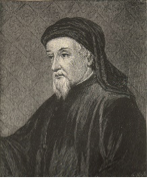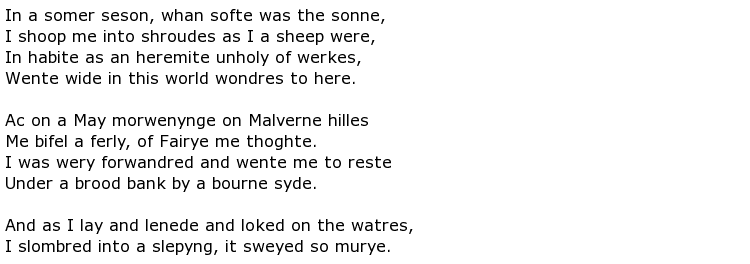 William Langland was a 14th century English poet who is most famous for his epic tale of The Vision of Piers Plowman, a long poem written in unrhymed, alliterative verse. Critics have compared this work favourably with the poetry of Geoffrey Chaucer who was alive at about the same time. The main problem with this piece of work though is the very size of it – some 47 separate manuscripts. Some have suggested that not all of it was written by Langland. After such a long passage of time it is difficult to prove it one way or the other.
William Langland was a 14th century English poet who is most famous for his epic tale of The Vision of Piers Plowman, a long poem written in unrhymed, alliterative verse. Critics have compared this work favourably with the poetry of Geoffrey Chaucer who was alive at about the same time. The main problem with this piece of work though is the very size of it – some 47 separate manuscripts. Some have suggested that not all of it was written by Langland. After such a long passage of time it is difficult to prove it one way or the other.
It is believed that William Langland was born in the year 1332 in the Worcestershire town of Ledbury, close to the Welsh border. It is quite likely that he went to school at nearby Great Malvern Priory. He was writing poetry at an early age and had a strong religious inclination which almost led to the priesthood. He didn’t quite manage that though as he only took minor orders.
At some point after completing his education he moved to London to seek his fortune. His talent for writing enabled him to make some kind of income copying documents. He supplemented this by singing at masses and, although it is unconfirmed, he may also have made money by reciting prayers for the dead. Indeed a lot of what is “known” about Langland comes directly from his Piers Plowman work as scholars have suggested that it is an autobiographical piece of work.
Unfortunately much of what is written might not be strictly true. Rather than recording factual accounts of a life the piece may have been of a largely fanciful, fictitious nature. The full title of it was, in fact, The Vision of William concerning Piers the Plowman. There was something called a tradition of “false confession” found in literature written during the middle ages in England and other parts of medieval Europe. What is found there though is interesting in parts, with descriptions of the life of a man called “Will” with details of life’s trials and tribulations, and descriptions of his wife. There are many religious references which allude, in some ways, to Langland’s tenuous links with the priesthood.
All the way through it though are sometimes veiled attacks on all disciplines of the clergy. It seems that he was not afraid to satirise religion which could, of course, have been a dangerous path to take at that time. Perhaps the fact that he favoured neither one side or another of the main religions saved him there – he could not be accused by any of the factions of being against them, and them alone.
Plowman was split into three different sections, or “dream visions” as they have become known. It was written in “Middle English” and is, as such, difficult to follow but here is an extract from the Prologue which at least gives a flavour of this significant piece of work:

Scholars of the work have more or less agreed that Langland was responsible for at least two of the three sections, if not all of them. Some arguments point to as many as five other writers being involved. The absolute truth will probably never be discovered.
The exact date of his death is ambiguous but most records suggest that William Langland died in the year 1390 which would have made him 58 years old.

